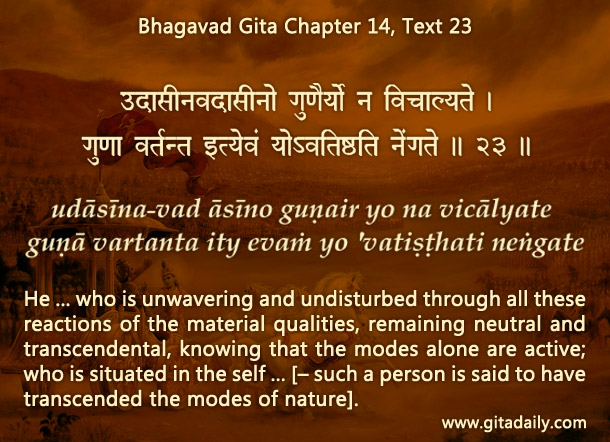Our thoughts are not always wise – we don’t have to follow their advice
Suppose we have a chronic disease. Our acquaintances may recommend various remedies. Knowing that they aren’t medical experts, we wouldn’t immediately follow their recommendations. We would use our own intelligence to evaluate those suggestions and then decide which to follow, if any.
Just as we have many external inexpert advisers, we similarly have many internal inexpert advisers: our own thoughts. Throughout our life and especially when we are in distress, many thoughts keep popping up within us, advising us what to do. We usually take our thoughts too seriously; we frequently assume that they are wise and that their advice is authoritative and beneficial. Believing them, we act impulsively, sub-optimally or even self-destructively.
To protect ourselves, we need to learn to evaluate our thoughts. How? By seeing them with the eyes of spiritual knowledge. Gita wisdom explains our essential identity, our ultimate purpose and the nature of our thoughts. We are eternal souls, parts of the supreme soul, Krishna. We are meant to serve Krishna through all our actions, thereby evolving spiritually towards lasting peace and joy. And our thoughts are random combinations of perception, recollection and imagination – some of them have value, most don’t.
The Bhagavad-gita (14.22) states that our thoughts arise from the three modes of material nature, which are subtle psychological forces that distort our consciousness. The Gita (14.23) urges us to observe our thoughts dispassionately, remembering that we are different from the modes and the thoughts they produce. By such detached inner observation, we can focus on those thoughts that facilitate our service to Krishna and neglect the rest.
Thus, by studying the Gita regularly and staying steadily aware of our purpose of serving Krishna, we can become wise enough to know which thoughts are wise enough to merit our attention.
Think it over:
- What happens when we indiscriminately follow the advice of our thoughts?
- What are the spiritual basics taught by the Gita?
- How can we evaluate our thoughts?
To know more about this verse, please click on the image
Explanation of article:
https://www.youtube.com/watch?v=h_Smqbxm2TM
Podcast:


Nice explanation..Hari bol
so true that many thoughts keep popping up which sometimes lead to negative thinking and self destructive
but as said if we see through spiritual knowledge it will help us to let go and think effectively